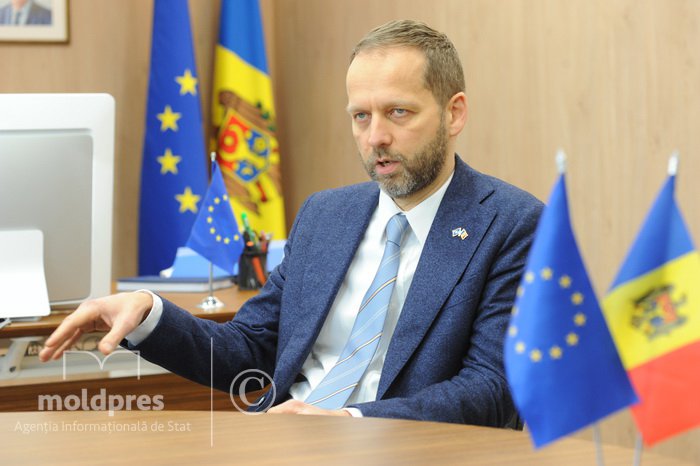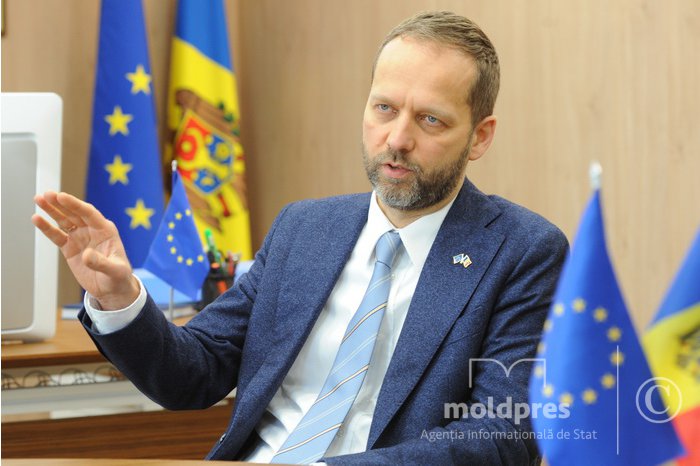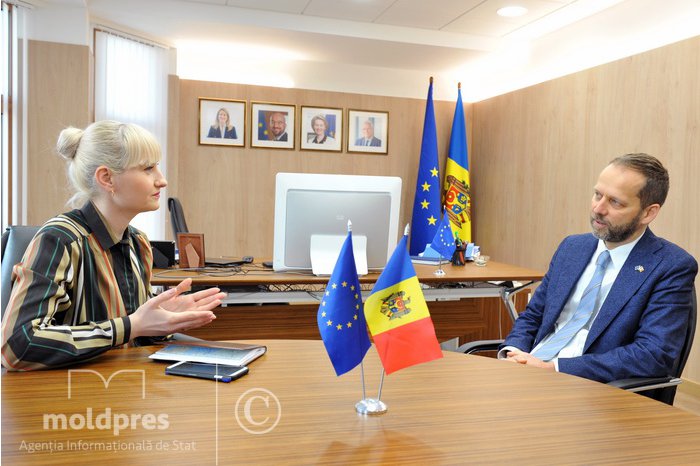It is very important for Moldova to develop in nine sectors highlighted by European Commission - EU Ambassador says
13:58 | 31.01.2023 Category: Interview, Event
Head of the EU Delegation to Moldova, Ambassador Janis Mazeiks has given an exclusive interview with the MOLDPRES State News Agency on up-to-date issues: the country's European integration, the energy crisis and the Transnistrian conflict.
MOLDPRES: In next March, the European Commission is going to assess the carrying out of the action plan for the implementation of those nine recommendations made to the Republic of Moldova at the giving of the status country candidate for accession to EU. How prepared is the Republic of Moldova for this assessment, which are the most important reforms already carried out and where should the Chisinau authorities make more effort? What actions come next following this assessment?
Janis Mazeiks: The next March assessment will, most likely, be an informal one and will not determine the next steps for the country. Yet, certainly, it is very important that the Republic of Moldova evolves in all the nine sectors highlighted by the European Commission. It is very good that the government has prepared an action plan for implementation of all points and more measures have been carried out for their fulfillment. Some of the provisions are easier to fulfill, while others take more time. I mean the justice reform or the conviction in court of people involved in corruption acts. Nevertheless, I think that the progress is pretty stable. I saw the wish and effort of the president, the government and the authorities. The EU supports the maintaining of the pace of change, but it is quite important to ensure quality as well. In other words, if you choose to get something done quickly or to do it properly, you better do it a little slower, as we are not in a speed race. The process of evaluating the performances of the Republic of Moldova is not only related to the action plan, because the action plan is a Moldovan document. So, it is not something that would be an opinion of the European Commission, but it is a very good starting point for us, so that we can understand what the Chisinau government is doing. We will reflect more on this in the next progress report, which will be published in October, this year. Until then, there will be a document, which is currently under preparation, which will not be focused on those nine steps, but on the transposition of the European Union's acquis, i.e. how well the Moldovan legislation meets the EU legislation's requirements in different sectors.
I find out that the Government's activity is particularly difficult, as it faces multiple crises. The refugees' crisis, the energy crisis and economic difficulties have put additional pressure on the government's limited resources. Yet, at the same time, in these very difficult circumstances, there are elements that paradoxically facilitate the European integration process. The energy sector is a very good example, because in all these crises, Moldova sped up its integration into the EU in the energy sector. The country has been part of the European Energy Network, along with Ukraine, since February 2022. A large volume of work has been carried out on legislation. As for the refugees' crisis, the government adopted the temporary protection status. This is also relevant for the implementation of the EU acquis. These issues, which are directly related to multiple crises, can also provide support to EU candidate status.
MOLDPRES: A topical subject remains the Transnistrian conflict. How do you see its evolution and what role it would have in the EU integration process?
Janis Mazeiks: The cooperation we have with the Transnistrian region is part of the activity we have with the Republic of Moldova as a whole. For example, the Association Agreement and the Deep and Comprehensive Free Trade Agreement regard including the Transnistrian region, and we see this as one of the success stories, as about one third of the exports from the Transnistrian region go to the EU. So, this is a region which is also integrated into the EU. Certainly, the topic will be relevant for the next stages of integration and it will be necessary to examine each negotiation chapter. It is important that there is a permanent dialogue between the two banks of the Dniester river, in order to solve important issues for people's living. At the same time, as for the discussions on more major issues, such as the political solutions, it is most likely that this is not the opportune moment, because if in the 5+2 negotiation process, two sides are at war, because of Russia's invasion in Ukraine, it is not realistic for one to expect important matters to be achieved.
At this point, our engagement with the Transnistrian region regards the trade and confidence-building measures. There is a set of projects aimed at both banks of Dniester, in order to promote trust between citizens and establish contacts. I have recently attended an awards ceremony for business people from both banks. We often give grants or provide advisory services, there is a business HUB in Tiraspol, which we support. So, our support is there. However, at this stage, the dialogue between Chisinau and Tiraspol, which we back, is paramount.
MOLDPRES: Deputy Prime Minister Andrei Spînu has recently said that Moldova had enough gas to go through this winter. Nevertheless, the government plans to continue purchasing gas for next winter. What would be the best options in this respect, I mean the countries from which we might buy the gas, the distribution route and the best purchasing price?
Janis Mazeiks: First of all, it is very important to recognize the progress the country has made in the energy sector. Because it was obvious last autumn that, in a situation similar to the 2021 crisis, the country was much better prepared. Given the cutting of gas supplies from Gazprom, which was not predictable, or the decrease of electricity imports by 30%, as Russia was bombing the Ukrainian energy infrastructure, Moldova managed to provide citizens with gas and electricity. This means that, at this point, the country has much better resilience than it had one year ago. This is due to the fact that the government prioritizes the energy independence and resilience. At the same time, the European Union and other international donors have provided much expertise in this sector, in order to enhance the country's capacities and be able to buy electricity and natural gas from other sources. As for the gas reserves, you have real alternatives and all needed capacity. The government must consider the best options. We will continue to provide you with the necessary expertise. The experts involved in the purchasing of gas have the knowledge necessary on the gas procurement sources.
If we refer to the security of gas storage in Ukraine, experts told us that this source is a safe one, due to the organization of storage capacities. It is very good that Moldova is diversifying its sources and this is one of the key issues you need because one of the problems in 2021 was that you had no reserves or alternatives. Now, you have reserves, some of them are stored in Ukraine, the others - in Romania. As far as Gazprom is concerned, unfortunately, we have seen that this concern is not reliable, as it has reduced the gas supplies, which would not be in accordance with the contract concluded. So, it should be taken into account that Gazprom is an unpredictable cooperation partner, and therefore it is necessary to have alternatives.
MOLDPRES: Following the unleashing of the war in Ukraine and the limitation of gas volumes by Gazprom, the problem of power supply appeared in the Republic of Moldova. How could we minimize the risks of providing electricity to our country, what would the best sources of supply be, taking into account the infrastructure of the electricity networks and the purchasing price?
Janis Mazeiks: As regards electricity, the situation is similar to gas. Firstly, it is important to diversify the sources. You don't have to rely on a single source, as it was in the past, when everything was bought from MGRES. This is an area that needs to be worked on, because there have been physical limitations on the amount of energy that can be transported from Romania. There is a project on creation of other interconnections with Romania, which will improve the situation as to the energy security. The bigger the diversity of sources is, the fewer leverages external actors will have in order to influence the country, in this case - Russia, to be able to use certain leverages on Moldova. The second direction of work is to have more domestic production. If you produce electricity domestically, such as renewable energy, you are less dependent on electricity coming from outside and can also make some savings. At the same time, if it's about renewable energy, you also help the climate. Another important direction is energy efficiency. The EU has a lot of projects on backing Moldova, as many buildings are old and the heat is not kept inside them.
MOLDPRES: In the end of last year, the USA and the United Kingdom set sanctions including against the former leader of the Moldovan Democratic Party (PDM), Vladimir Plahotniuc and the leader of the Shor Party, Ilan Shor. Are the EU states or the law-enforcement bodies of European countries going to approve any similar decisions on people investigated for corruption acts in our country?
Janis Mazeiks: The European Union operates under slightly different rules than the United States or the United Kingdom. The EU has certain sanctions mechanisms at the European level, but not for corruption. At this point, sanctions are targeted against specific countries; it is about sanctions against Russian officials, Russian companies or sanctions for human rights' violations. There is currently a discussion among member countries whether there should be sanctions mechanisms for corruption as well. However, this discussion has not been completed and there is no working mechanism. At the same time, the EU law enforcement bodies can have a close cooperation with the authorities, prosecutors and investigation services of the Republic of Moldova, as there are crimes which regard the EU member countries. It is about mechanisms that are already in force and will be able to be developed over time.
MOLDPRES: In September 2022, we marked one year of your holding the position of Head of the EU Delegation to Moldova. Which are the main changes recorded on the period of your mandate?
Janis Mazeiks: The biggest change was that Moldova became a candidate country for EU membership. And not only it became a candidate state, but it also worked quite actively towards the next stage, to get to negotiations. But one key change we saw was the authorities' commitment to reform. We have seen how a country facing more crises has the wish and willingness to continue working to bring the state closer to EU. I think that this is the most important change. It is very important that this pace is maintained, since the stage in which the Republic of Moldova holds the status of a candidate for EU integration will last several years, since EU integration is a gradual process. It is also quite important that the members of the society look at the EU as a structure which brings benefits to them and their children. You have seen how strong our involvement was in the trade sector. We are the biggest commercial and cooperation partner as to the country's support and development, either in the economy or in democracy, either in the local communities or the vulnerable ones, and I think it is very important that we continue to carry out these measures in the long run.
MOLDPRES: Mr. Ambassador Janis Mazeiks, thank you for being kind to give this interview with our agency.




